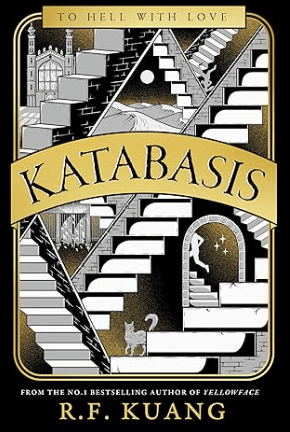
For all things fantasy, horror, and speculative fiction

Review Details
Review type: Book
Title: Katabasis
Author: R. F. Kuang
Publisher: Harper Voyager
Release date: 26th August 2025

Reviewed by: Elizabeth Peel
Other details: ebook RRP £9.99
Katabasis by R. F. Kuang
Book Review
Elizabeth Peel
‘Oh, the horror!’ wails a student damned to the first circle of R. F. Kuang’s hell. ‘Oh, to not be clever!’
Katabasis (2025)traces a Cambridge postgraduate’s journey through hell, reckoning with what it means to be clever and ambitious at an institution full of cleverness and ambition. Kuang renders, in detail both beautiful and gruesome, exactly how far cutthroat intellectuals might go to avoid admitting defeat, come hell or higher education.
The novel centres around Alice Law, a postgraduate studying analytic magick (yes, with the ‘k’, a lá Aleister Crowley) at Cambridge. Alice, finding herself without academic guidance after the sudden and explosive death of her supervisor, makes what she considers the only rational choice: she journeys into Hell to retrieve him. She is accompanied by Peter Murdoch, her brilliant, blithesome colleague, who remains a mystery and a frustration despite Alice’s best efforts. The pair ventures into a hell for academics, complete with a campus library, a student centre, and an eternal city for the equally endless writing of dissertations that receive no marks (the city is aptly named ‘Dis’).
As a longtime Kuang fan and a longtime underworld journey enjoyer (from Riordan to Hadestown), I expected quite a lot from this book. I was pleasantly surprised to find it different in both content and style from Babel (2022), and it is a testament to Kuang’s skill that she has made two novels about disillusioned academics at ancient British institutions so remarkably different. The 1980s setting of Katabasis shifts the focus from Victorian colonialism to twentieth-century inequities around education and gender; Alice remarks that she was admitted in the first year Magdalene College, Cambridge, admitted women, which was 1988.
Indeed, the role of women in academic institutions haunts Alice’s journey through hell. The tension between her identities as academic and a woman comes to a head in her recollection of a conversation with a feminist academic in her department who is a ‘spousal hire.’ Kuang enjoins readers to consider what, exactly, current models of feminism might be doing for ambitious women: ‘What you must realize, Alice, is that you cannot just take refuge in feminism when it suits you.’ Alice represents a characteristically post-Reagan dismissal of feminism as a catastrophizing neurosis of an older generation—and this indifference brings her only strife and confusion. Optimistically, I wonder if Kuang’s thoughtful, thorough engagement with what it means to be an ambitious woman might herald a rejection of both the girlboss and the tradwife in favour of a more holistic, more human model of what a woman might be.
The magic(k) system of Katabasis also packs a punch, dissecting the mystique of academia while developing a visceral emotional reality that keeps readers grounded all the way to Hell’s final circle. Kuang’s portrayal of analytic magick is an intelligent yet lively synthesis of logic and linguistics with a particular emphasis on semantics: the playful yet high-stakes role of paradox helps prevent scholarly dryness. In its magic, Katabasis is leagues beyond scholastic fantasy novels like Olivie Blake’s The Atlas Six (2020) or Naomi Novik’s Scholomance (2020-2022) and may find more kinship with Terry Pratchett’s Unseen University, a longtime favorite of mine for its thorough, witty engagement with the texture of academic landscapes. Katabasis conveys a disillusionment with the capricious waters of higher education, but not with the pleasurable exertion of learning; its strength is in its refusal to throw the baby out with the bath.
This is exemplified in Kuang’s knitting-in of literary and philosophical references, from the Nicomachean Ethics to Nabokov. The novel’s audience is implicitly specific—even narrow—but Kuang effortlessly sidesteps the pitfalls of campus novels like Changing Places (1975) by ensuring that the academic elements are tools for conveying Alice’s intellectual and emotional journey, rather than reducing her to a character through which the book can prove its intellectualism. Those with some math or semantics background will recognize the names Bayes and Kripke for the Easter eggs they are; those without will not be losing out on anything essential to the text. This novel is clearly written by someone who loves learning but is skeptical of its institutions. Alice and Peter set out convinced that without an institutional stamp across their razor-sharp minds, their lives are not worth living. Kuang asks whether a life does not need justification to be worth living—certainly not justification written out in a logician’s formula.
All reviews
Latest Reviews:
- Rose/House by Arkady Martine
- Pendragon RPG: The Sauvage King
- Januaries by Olivie Blake
- Basic Roleplaying: Creatures
- Five Mini-Adventures – PDF (Shadowdark RPG)
- Cursed Scroll Zine, Vol. 1: Diablerie! RPG Zine
- Empire of the Dawn by Jay Kristoff
- The God and the Gumiho by Sophie Kim
- Citadel of the Moon by Mike Chinn
- Hemlock and Silver by T. Kingfisher
Review tags:
Action (49) Adventure (70) Contemporary Fantasy (19) Fantasy (120) Gothic Horror (12) Harper Voyager (12) Historical Fantasy (14) Hodderscape (12) Horror (77) Orbit Books (33) Romance (28) Romantasy (13) Science Fiction (35) Titan Books (36) TorDotCom (13)
Leave a Reply